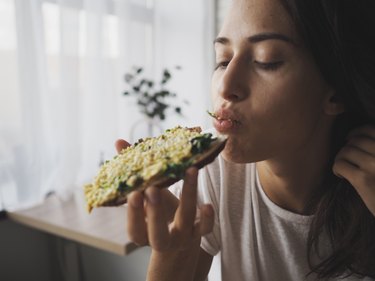
It can be hard to figure out how to eat around your workout schedule. If you exercise too soon after eating, you might feel sick. And if you eat too little or not at all before a workout, you might be feeling weak and low on energy.
So what do you do? Here's some expert-backed advice on finding the right balance.
Video of the Day
Video of the Day
What Happens if You Exercise Right After Eating
The Pros
There are many perks to grabbing a pre-workout snack, making it something many registered dietitians recommend. According to Brittany Modell, RD, CDN, a registered dietitian and founder of Brittany Model Nutrition and Wellness in New York City, you should treat your pre-workout foods as fuel. The right foods "can help prevent low blood sugar, settle your stomach and fuel your muscles," she says.
If you've ever exercised right after eating only to feel nauseated, you're not alone. "Some people can eat minutes before exercising and have no issues. Others have to wait at least 30 to 60 minutes," says Tony Castillo, RDN, LDN, a dietitian and co-founder of Nutrition for Performance in Clearwater, Florida.
The Cons
While the body is still able to digest food during easy and moderately hard exercise, that's not the case during more sweat-inducing sessions. "During intense exercise, there is a shift of blood flow from stomach to working muscles, which may create some gastrointestinal issues," Modell says.
Examples include stomachaches, nausea and heartburn. Because exercise can cause intra-abdominal pressure, it can lead to reflux and acid reflux-related symptoms during your workout. Sometimes it can even cause diarrhea, also known as runner's diarrhea, according to the Mayo Clinic. That's why it's important to wait at least an hour or more before exercising after you've eaten a full meal. (But more on that below.)
The Best Pre-Workout Foods for Your Exercise Schedule
Exactly how bad it is to exercise right after eating largely depends on the type of food you eat and the workout you do. Here's the best way to make your pre-workout fuel work for you, depending on when you plan to eat and exercise.
If You're Working Out in an Hour or So
Keep your pre-workout snacks light. To get the most out of your workouts — and keep your stomach happy — Modell suggests eating mostly carbs. "That ensures your body has fuel to exercise," he says. "Try a piece of fruit, a slice of toast or some granola."
A high-carbohydrate, low-fat meal that has a moderate amount of protein is also easy to digest and will help you maintain your blood sugar. Why such an emphasis on fast-acting carbs? "They're more readily available for your muscles to use up and empty quickly from the stomach, compared to a protein or fat," she says. Castillo notes that high-protein and high-fat foods take longer to digest, making them more likely to hang around in your stomach during exercise and make you feel sick.
If You're Working Out in a Couple Hours or More
You can eat a full and balanced meal about two to three hours in advance of your workout. This way, your body has time to fully digest the nutrients in order to use them.
Examples of a great pre-workout meal include oatmeal or whole-grain toast with nut butter, an egg and a piece of fruit or a turkey sandwich on whole-grain bread. These foods contain the right combo of carbs, protein and fat to help you feel satiated while delivering glycogen, aka stored fuel, to your muscles.
Protein is particularly important for muscle recovery and growth, so getting your fill of it before your sweat session gives your body a steady stream of the muscle-building nutrient. Some great sources of lean protein are eggs, chicken, fish, lean, grass-fed beef, tempeh and tofu.
Healthy fats also help enhance exercise performance by providing fuel for long, endurance workouts. Some examples of healthy fats are nuts, seeds and avocados.
The Bottom Line: How Bad Is It to Exercise After Eating?
When it comes down to it, exercising right after eating is a personal choice, Castillo says. It may take some trial and error to see what helps you maintain your routine and reach your goals while feeling your best. You have to do what works best for your body.
Tip
Whether you decide to exercise before or after eating, one thing you should always do is drink water before, during and after your workout. The American College of Sports Medicine recommends drinking 17 ounces of fluid (2 to 3 cups of water) 2 hours before exercise.
Is this an emergency? If you are experiencing serious medical symptoms, please see the National Library of Medicine’s list of signs you need emergency medical attention or call 911.